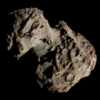| Revision as of 10:25, 2 January 2025 editKyloRen2017 (talk | contribs)Extended confirmed users5,317 editsm →Discovery and observations: Comet fragmentation← Previous edit | Revision as of 20:50, 2 January 2025 edit undoEighteenFiftyNine (talk | contribs)Extended confirmed users1,861 edits →Discovery and observations: Changed “splitted” to “split”Tag: Visual editNext edit → | ||
| Line 35: | Line 35: | ||
| Australian colonist ] first spotted his comet through a telescope from his personal observatory on the night of 19 July 1889.{{r|mackay_museum}} By coincidence, it is also the day of its perihelion.{{r|jpl}} He later reported his discovery to the ] on 22 July 1889, noting it as a tail-less object now visible with the naked eye, located within the constellation ].{{r|Nature_1889}}{{efn|Reported initial position upon confirmation was: ] {{=}} {{RA|12|46|9}}, ] {{=}} {{DEC|122|29|6}}{{r|Nature_1889}}}} The comet's ] was reported to be around magnitude 5.0–6.0,{{r|Millosevich_1889}} with a ] about 5 arcminutes in diameter.{{r|Ellery_1889}} | Australian colonist ] first spotted his comet through a telescope from his personal observatory on the night of 19 July 1889.{{r|mackay_museum}} By coincidence, it is also the day of its perihelion.{{r|jpl}} He later reported his discovery to the ] on 22 July 1889, noting it as a tail-less object now visible with the naked eye, located within the constellation ].{{r|Nature_1889}}{{efn|Reported initial position upon confirmation was: ] {{=}} {{RA|12|46|9}}, ] {{=}} {{DEC|122|29|6}}{{r|Nature_1889}}}} The comet's ] was reported to be around magnitude 5.0–6.0,{{r|Millosevich_1889}} with a ] about 5 arcminutes in diameter.{{r|Ellery_1889}} | ||
| By 24 July 1889, ] reported that the comet brightened to magnitude 4.0, with its nucleus surrounded by an extensive coma.{{r|Kronk_2003}} As the comet started to fade away in the following days, it was observed that its nucleus |
By 24 July 1889, ] reported that the comet brightened to magnitude 4.0, with its nucleus surrounded by an extensive coma.{{r|Kronk_2003}} As the comet started to fade away in the following days, it was observed that its nucleus split into two fragments on 3 August 1889.{{r|Ricco_1889}} | ||
| == References == | == References == | ||
Revision as of 20:50, 2 January 2025
Non-periodic comet| Discovery | |
|---|---|
| Discovered by | John Ewen Davidson |
| Discovery site | Mackay, Queensland |
| Discovery date | 19 July 1889 |
| Designations | |
| Alternative designations | 1889e 1889 IV |
| Orbital characteristics | |
| Epoch | 17 July 1889 (JD 2411200.5) |
| Observation arc | 115 days |
| Number of observations | 92 |
| Aphelion | 869.38 AU |
| Perihelion | 1.0397 AU |
| Semi-major axis | 435.21 AU |
| Eccentricity | 0.997611 |
| Orbital period | ~9,100 years |
| Inclination | 65.992° |
| Longitude of ascending node | 287.712° |
| Argument of periapsis | 345.862° |
| Last perihelion | 19 July 1889 |
| TJupiter | 0.526 |
| Physical characteristics | |
| Comet total magnitude (M1) | 6.5 |
| Comet nuclear magnitude (M2) | 5.0–6.0 |
| Apparent magnitude | 4.0 (1889 apparition) |
Comet Davidson, formal designation C/1889 O1, is a non-periodic comet that became visible to the naked eye in 1889.
Discovery and observations
Australian colonist John Ewen Davidson first spotted his comet through a telescope from his personal observatory on the night of 19 July 1889. By coincidence, it is also the day of its perihelion. He later reported his discovery to the Melbourne Observatory on 22 July 1889, noting it as a tail-less object now visible with the naked eye, located within the constellation Centaurus. The comet's nucleus was reported to be around magnitude 5.0–6.0, with a coma about 5 arcminutes in diameter.
By 24 July 1889, John Tebbutt reported that the comet brightened to magnitude 4.0, with its nucleus surrounded by an extensive coma. As the comet started to fade away in the following days, it was observed that its nucleus split into two fragments on 3 August 1889.
References
Notes
Citations
- ^ D. Jesser. "Davidson's Comet". Mackay Historical Society. Retrieved 2 January 2025.
- "Comet Names and Designations". International Comet Quarterly. Retrieved 2 January 2025.
- ^ "C/1889 O1 (Davidson) – JPL Small-Body Database Lookup". ssd.jpl.nasa.gov. Jet Propulsion Laboratory. Retrieved 24 November 2023.
- ^ G. W. Kronk (2003). Cometography: A Catalog of Comets. Vol. 2: 1800–1899. Cambridge University Press. pp. 639–643. ISBN 978-0-521-58505-7.
- ^ "Our Astronomical Column" (PDF). Nature. 40: 328–329. 1889. doi:10.1038/040328a0.
- E. Millosevich (1889). "Osservazioni della cometa 1889...(Davidson)" [Observations of the comet 1889...(Davidson)]. Astronomische Nachrichten (in Italian). 122 (10): 187–190. Bibcode:1889AN....122..187M. doi:10.1002/asna.18891221004.
- R. L. J. Ellery (1889). "Observations of Comet 1889 IV (Davidson)". Astronomische Nachrichten. 123 (6): 91–92. Bibcode:1889AN....123...91E. doi:10.1002/asna.18901230606.
- A. Ricco (1889). "Osservazioni della cometa 1889 IV" [Observations of the comet 1889 IV]. Astronomische Nachrichten (in Italian). 123 (13): 205–208. Bibcode:1889AN....123..205R. doi:10.1002/asna.18901231305.
External links
- C/1889 O1 at the JPL Small-Body Database
This comet-related article is a stub. You can help Misplaced Pages by expanding it. |

